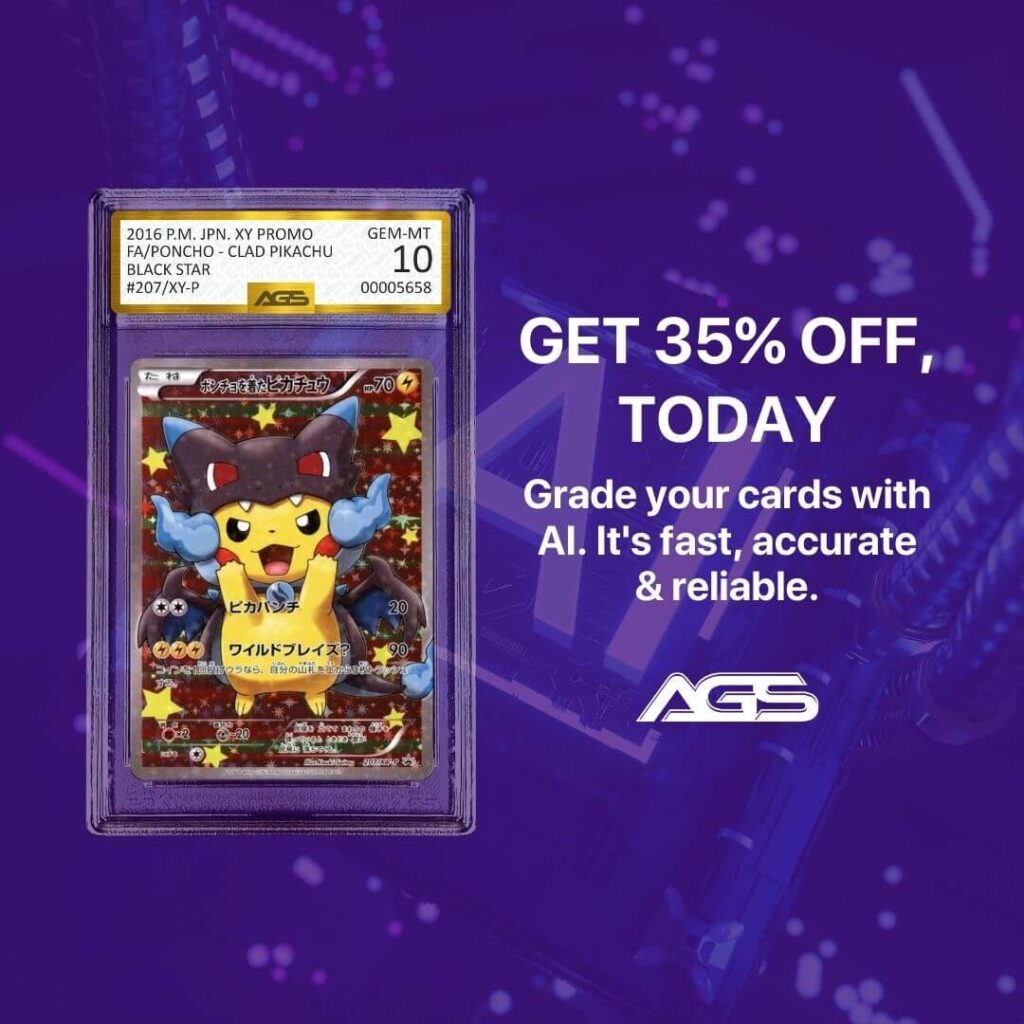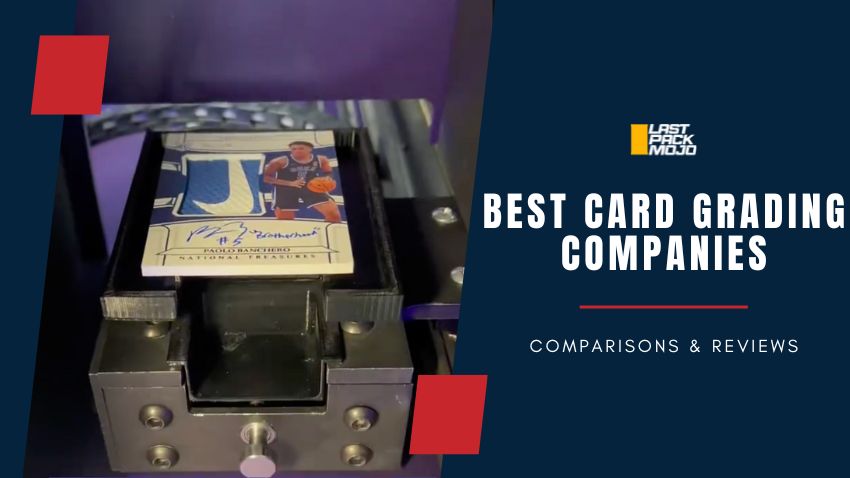So you have decided to get your sports card graded. Obviously, the next thing you need to do is choose which grading service you’ll get. It can definitely be taxing to choose between the number of available grading companies in the market, especially since there are a lot of factors to consider, from credibility, value and pricing, aesthetics, and more.
For some, choosing the popular ones like PSA, BGS or SGC might be the easiest choice. However, sports card collectors are also missing out on many other services that are not only cheaper but also promising, technologically advanced, and/or aesthetically more beautiful to look at.
In this article, we’ll share and review the best card grading services to help you make the best decision.
1. AGS (Automated Grading Systems)
Automated Grading Systems of AGS is one of the fastest-rising card grading services in the sports card market, and for good reason. The company uses 100% artificial intelligence in order to prevent human error and bias in the whole process, making sure that the card grades are accurate.

In order to prove the accuracy and consistency of their grading system, AGS has shared several social media videos where they show cracking their previously graded cards and having them undergo their AI grading process again. The results were certainly impressive, especially since it highlights how human error was completely eliminated in the whole process.
Grading price ranges from $14 to $50 depending on the desired turnaround time.
Quick Facts
Why choose AGS?
2. Rare Edition
Rare Edition is also a new player in the industry that could very well threaten the other more established grading companies, thanks to its focus on customer service, quality and aesthetics. The company has a system that allows customers to track their card status from its arrival to the grading process and delivery, ensuring everyone’s peace of mind.
In order to grade cards, Rare Edition uses a high-resolution scanner that allows them to evaluate cards at a “per pixel level.” They also provide a grading report after the process is done to show customers why their cards ended up having such a grade.
Rare Edition’s biggest differentiator is its sturdy and aesthetically pleasing card slabs. It’s quite bulky for sure (which might not be for everyone), but it also has a rubber casing on the sides to protect the card case. Price ranges from $39 to $79.
Quick Facts
Why choose Rare Edition?
3. PSA (Professional Sports Authenticator)
In the sports card market today, there’s no sports card collector who doesn’t know PSA. Even those new in the hobbly have probably come across a card graded by PSA or at least have heard of it. They are the current leaders in card grading, with their biggest advantage being their influence in the card market and its prices.
Its highest grade, which is a PSA 10 (indicating that a card is virtually perfect), often commands massively insane prices. This is the reason why plenty of collectors often send their cards to PSA since it maximizes the potential value of their cards.
Of course, the issue with PSA has been its consistency when it comes to grading. Despite that, though, it continues to dominate.
Grading price starts at $15 depending on the service taken, as well as the value of the card. Its card slab has a classic feel to it.
Quick Facts
Why choose PSA?
4. BGS (Beckett Grading Services)
When talking about PSA, BGS or Beckett Grading Services often follows. After all, if there is any grading company that can make a case as the king of grading against PSA, it’s BGS.
BGS is known to be stricter when it comes to its grading process, which is why many choose its services over PSA. While PSA’s grading inconsistency has come into question plenty of times, BGS has maintained its reputation when it comes to grading.
The company also popularized the subgrades, highlighting a card’s condition based on its corners, centering, surface, and edges.
PSA 10 holds a ton of value over a card graded with a BGS 9.5. However, it pales in comparison to a card with a black label BGS 10, which is basically a card in perfect condition. Since they are really hard to get, they also hold immense value.
BGS grading services range from $18 up to $500.
Quick Facts
Why choose BGS?
5. SGC (Sportscard Guaranty Corporation)
SGC has made its mark in the sports card industry thanks to its consistent grading process. On its website, it claims to use “a scale which eliminates the grades known as ‘tweeners’: no grading scale is more accurate or consistent.”
The company has one of the best reputations in the industry. Some can even argue they have better credibility than PSA and BGS. Why is that? Well, it’s because three of the most expensive sports cards ever sold have been graded by SGC.
A 1952 Mickey Mantle card, graded 9.5 by SGC, was sold for $12.6 million at an auction last 2022. Two T-206 Honus Wagner cards–graded SGC 2 and 3–also sold for a combined $13.85 million.
Unfortunately, while SGC is a good option for grading vintage cards, it has been left behind by PSA and BGS in grading modern sports cards.
SGC pricing ranges from $24 to $85, though there are additions depending on the value of the card. SGC is also popular for the tuxedo look of its card slabs.
Quick Facts
Why choose SGC?
6. CGC Cards (Certified Sports Guaranty and Certified Guaranty Company)
Certified Sports Guarany and Certified Guaranty Company have recently merged to form CGC Cards, with the grading service now catering to sports cards, trading cards, and other pop culture collectibles. It’s certainly a big move since CGC–established in 2020–has built a reputation as an industry leader in the general collectibles space.
It is interesting to note that CGC’s pricing and holders are really popular compared to CSG before the merger, and it’s definitely great to see CGC Cards adopt the classic black label and crystal clear holder that it’s been known for.
According to its announcement, CGC Cards will also have a special label for its highest-graded cards of Pristine 10, featuring a black-gold color. This is comparable to the black label BGS 10.
CGC Card’s pricing is expected to be competitive (no official details have been announced). Certified Sports Guaranty’s grading fee started at $12 previously.
Quick Facts
Why choose CGC?
7. HGA (Hybrid Grading Approach)
HGA was able to carve out a niche in the grading service industry with its beautifully designed color-coordinated labels. It generated some serious following, especially from those collectors who want their cards graded so they can display it.
The company says it has software that allows it to scan, analyze, and grade cards “without subjectivity.” However, HGA has refused (or at least, removed) to mention the use of artificial intelligence in its process.
Still, HGA has really good pricing and even promises a full refund if they are unable to deliver cards within the promised turnaround time. Pricing ranges from $14 to $75.
Quick Facts
Why choose HGA?
8. ISA (International Sports Authentication)
ISA is relatively new to the industry, having been established in 2010. Based on its website, however, the company has grown steadily over the past decade and even breached its 100,000th card graded in 2016.
That gives ISA some legitimacy. Its site doesn’t really provide much details about the grading process, but it does offer some similarities to PSA. Its highest grade is ISA 10, which it describes as “nearly flawless.”
Its slab design is also similar to PSA, with the major difference being its colors. ISA’s primary color is blue.
As for the grading fee, however, ISA’s price range is at $18 to $35.
Quick Facts
Why choose ISA?
9. Arena Club
Arena Club burst into the card market in 2022 and has since become increasingly popular due to its rather unique service. Backed by MLB icon Derek Jeter, the Arena Club also makes it easier for collectors to store and sell their cards.
Grading wise, the Arena Club says it uses “advanced machine learning” to accurately and quickly grade cards. What really differentiates it, though, is its vault where collectors can have their cards stored.
Card owners are given what the company calls a “digital proof of claim,” which they can display in their virtual showrooms. Cards can easily be sold through the platform’s marketplace without all the hassle of packaging and shipping.
It’s also easy to retrieve the cards from the vault, though it comes with a fee of $2 per card. Grading fee starts at $10, including the option to have it stored in their vault.
Quick Facts
Why choose Arena Club?
10. TAG (Technical Authentication & Grading)
TAG unarguably has one of the best-looking slabs in the card grading industry, and its grading process also looks promising. As described on its website, it uses “Photometric Stereoscopic Imaging” in order to properly and accurately grade cards consistently.
What’s impressive about TAG is the level of customer care and support it provides. It actually provides premium service without actually breaking the bank. It provides a submission kit that is complete with all the necessary materials to protect your card when shipping for grading.
Several fans also love how its slab looks, especially the fact that its labels are directly integrated on the case.
Grading price ranges from $14 to $35.
Quick Facts
Why choose TAG?
Wrapping Up
Choosing a grading company that provides the best card grading services is crucial to attaining what you want for your card. Determining the purpose of grading is a necessary step before choosing which service to take.
If you want a card graded for personal collection, then there’s no need to use the pricier services of established leaders in the industry. There are plenty of cheaper options or more quality alternatives that will make sure your cards will be displayed better.
But for those looking to increase the value of their cards to sell them, then it’s advisable to choose among the current market leaders.
Related Article: How to Get Your Cards Graded
FAQs
It depends. If you’re keeping the cards for yourself and not selling them, you may grade them. But if you plan to sell them, make sure it’s worth the cost of grading.
The cost of grading cards depends on the card grading service company you choose, the cost varies. However, it can range anywhere from $10 to $1000 or more depending on the value of the card.
Not all. Grading increases the value of the card if it gets a high mark. However, it sometimes decreases the value of the card if the grade isn’t high. This is especially true for non-numbered cards.

